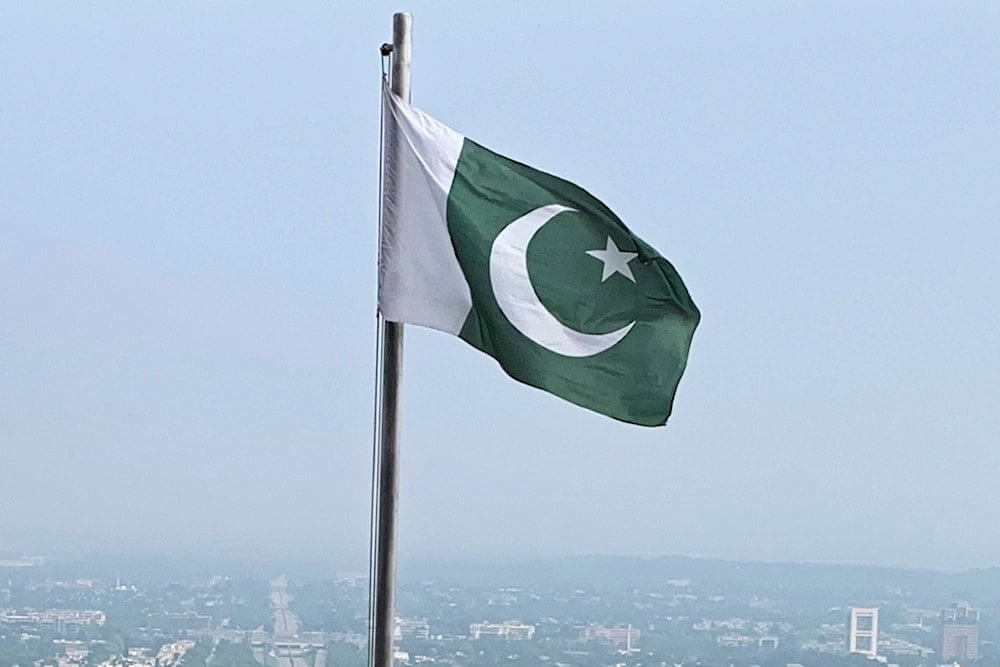Record number of Pakistani journalists killed in just six months
Adil Jawad, who works for an organization investigating journalist killings, says at least four of the seven deaths were likely work-related.
-

A Pakistani flag flies on a lookout in Islamabad, Pakistan, on July 27, 2022. (AP)
Seven reporters have been killed in Pakistan during the first six months of 2024, setting a grim record with half the year remaining, The Guardian reported.
The latest victim, Khalil Jibran, a former president of a local press club in Khyber Pakhtunkhwa province near the Afghan border, was ambushed in June. Two men dragged him from his car and opened fire on him.
According to Adil Jawad, who works for an organization investigating journalist killings, at least four of the seven deaths, involving both traditional journalists and citizen reporters, were likely work-related.
Most of these killings have occurred in smaller towns and cities, where social media has amplified the presence of professional journalists and provided a platform for citizen reporters, the news website highlighted.
Jawad pointed out that these attacks are occurring amid “widespread impunity” for the perpetrators.
The Freedom Network, an advocacy group for press freedoms, reported that between 2012 and 2022, 53 journalists were killed due to their work, but only two cases during that period resulted in the punishment of the culprits.
The Guardian explained that citizen journalism in Pakistan has surged in recent years, driven by the rise of social media and restrictions on mainstream media. Ordinary citizens have begun reporting on the deteriorating law and order situation and corruption among the ruling elite.
In late May, Nasrullah Gadani, known for holding local politicians, landowners, and feudal lords accountable in his reporting, was killed in the Badin district of Sindh province, sparking protests. His brother, Yaqoob Gadani, accused Khalid Lund, a local member of parliament, of orchestrating the killing, an allegation Lund has denied.
Just three days prior to Gadani’s death, another journalist, Kamran Dawar, was killed in the North Waziristan district of Khyber Pakhtunkhwa.
"Journalists and media workers in Pakistan have a constitutional right to freedom of expression, however this is undermined by targeted attacks, assaults, and killings," indicated Anthony Bellanger, the general secretary of the International Federation of Journalists, commenting on these deaths.
He underlined that "authorities must ensure that the media is free to work without fear of retribution and ensure that these killings are subject to an immediate, thorough, and transparent investigation."
In this year’s World Press Freedom Index, published by Reporters Without Borders, Pakistan dropped two places, falling to 152 out of 180 countries. The index described Pakistan as "one of the most dangerous countries in the world for journalists, with three to four murders each year that are often linked to cases of corruption or illegal trafficking and which go completely unpunished."
In its World Report 2024, Human Rights Watch (HRW) highlighted that the Pakistani government of Prime Minister Shehbaz Sharif has "clamped down on dissenting media" in 2023. The document cited journalists reporting "government intimidation, harassment, and surveillance."
In the same year, several journalists, described as supporters of imprisoned former Prime Minister Imran Khan, were reported missing, while others were charged with sedition, according to multiple rights and media watchdogs.
Pakistani media were barred from covering the speeches or rallies of Imran Khan on television.
Amnesty International rights group said it was alarmed by the Pakistani authorities’ "crackdown on voices critical of the state and military."
Read more: Protesters demand action against US, UK ambassadors in Pakistan

 3 Min Read
3 Min Read








